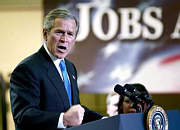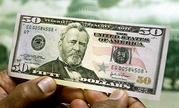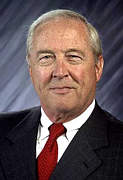Untitled Document
 |
US President George W. Bush
at the Timken Company in 2003 promoting his tax cut plan. |
Want to become a US ambassador? It’s not as hard as you may think. Just
donate a couple of hundred thousand to President George W. Bush’s campaign
coffers and pick your city. The president’s new cadre of diplomats tend
to be generous campaign donors, including the wealthy Ohio ball-bearing manufacture
who is expected to run the US Embassy in Berlin.
It’s possible that David Wilkins, 58, is just a tad too honest for his
new job as Ambassador of the United States in Canada. How else to explain his
admission that he’s only visited America’s big neighbor to the north
once in his life -- 34 years ago -- on a visit to see Niagara Falls? Wilkins,
a deeply religious South Carolina Republican, sees his appointment to the diplomatic
corps as a "sign of God."
In truth, one could probably look to more worldly reasons to explain the appointment.
Wilkins is one of the Republican Party’s most talented fundraisers; in
return for his efforts, which helped secure the re-election of US President
George W. Bush, the party rewarded Wilkins with the honorary title of "Ranger,"
a distinction that’s bestowed on anyone who contributes or raises more
than $200,000 for the party.
In the coming months, Rangers, Pioneers (starting at $100,000) and Super Rangers
($300,000 and up) will be beginning their new jobs as diplomats all over the
world. According to the most recent count, 30 of the Republican Party’s
biggest donors have been rewarded with posts in sun-drenched island nations
like Mauritius and the Bahamas, or in prestigious European capitals.
Among those prestigious capitals is Berlin. Last week, the US State Department
informed the German Foreign Ministry that William Robert Timken, 66, an Ohio
industrialist, will assume the post of US Ambassador to Germany this fall --
a post that has been vacant for the past four months since Daniel Coates’s
term ended. It is a position that Timkin, a Super Ranger with ancestors from
Germany, requested himself.
 |
Want a post as an ambassador?
You'll need to donate a pile of these to the Republican party. |
The consulate-for-cash principle isn’t exactly new. Next to nights in
the White House, parties at Bush’s Crawford, Texas ranch and invitations
to state dinners, diplomatic service is considered the most sought-after form
of recognition for the party’s big spenders. And the price for a ticket
into the diplomatic corps is high -- at least six figures according to an unwritten
rule that’s been in place ever since Richard Nixon was in the White House.
Back then, the president instructed his chief of staff that "anybody who
wants to be an ambassador must at least give $250,000."
Despite legislation enacted in 1980, under which campaign contributions may
not be used as a factor in the selection of new ambassadors, US presidents,
including George W. Bush, have never felt particularly bound by the law. Former
US President Bill Clinton also used campaign contributions as a factor when
choosing political appointees -- albeit not nearly to the same degree as the
current president. Indeed, according to the conservative political magazine
National Journal, "Bush’s first 35 political appointees to the diplomatic
corps gave an average of $141,110 to him and other Republican campaigns and
committees during 1999-2000." The practice is continuing during his second
term, and even members of Bush’s new administration are beginning to doubt
whether using successful fundraisers as diplomats is such a good idea, especially
in light of the current global mood.
The US’s image abroad is extremely poor according to a survey released
last week by the Pew Global Attitudes Survey and American relations with European
allies are still far from rosy despite efforts this year at improvement. Secretary
of State Condoleezza Rice is banking on her diplomats to repair the country’s
damaged reputation and to once again convince foreigners, especially skeptical
Europeans, of the benefits of US foreign policy. One US diplomat even expressed
hopes that one day the US ambassador to Germany could go on German talk shows
without having to rely on an interpreter. US ambassador Coats, in Berlin until
February of this year, was only able to manage a few fragments of German after
three and a half years in office.
Yet hardly any of Bush’s new additions to the diplomatic ranks is especially
gifted when it comes to foreign languages. Instead, America’s new crop
of diplomats bound for the old continent reads like a Who’s who of Bush’
biggest supporters, financial and otherwise. Ronald Spogli, a "Pioneer"
and an investment advisor from California, is going to Rome. Craig Stapleton,
a "Ranger" married to one of the president’s cousins, will be
moving to Paris. Great Britain, accustomed to such hobby ambassadors like no
other country in Europe, will be trading in horse breeder William Farish for
car dealer Robert Tuttle.
 |
New Ambassador to Germany
William Robert Timken. |
Bush’s future man in Berlin is an especially well-deserving patron, a
man who already played an important part in bankrolling Bush Senior’s
election campaigns. Republican presidents like to use his factory in Canton,
Ohio as a backdrop when promising tax cuts or conjuring up America’s economic
might in election campaigns. The current president was there just last October,
when Ohio was considered a swing state. At the Republican Convention in New
York, Timken was one of the delegates casting his ballot for a second Bush term.
Worldwide sales of his publicly-traded company, which specializes in all types
of ball bearings, are in the range of $4.5 billion. Timken also makes his money
manufacturing parts for combat helicopters and jets. According to press reports,
Timken has been awarded 60 percent of the Pentagon’s no-bid contracts
for these types of parts ever since Bush Junior first came into office.
Democrats revile Timken, who holds degrees in economics and history from top
US universities Harvard and Stanford, as a typical example of "Bush capitalism."
During the election campaign, Timken’s workers attending a party convention
complained that, despite receiving enormous tax breaks, the industrialist was
still moving jobs to China and India. Last week, officials at Berlin’s
Foreign Office were still speculating over whether Timken’s appointment
is a good or bad omen for German-American relations. So far the optimists seem
to have prevailed, though not for especially political reasons. They say that
Bonn, the former German capital, was simply too monotonous for these types of
hobby diplomats. The new Berlin, however, is just as fascinating to wealthy
Americans today as Paris or Rome.


